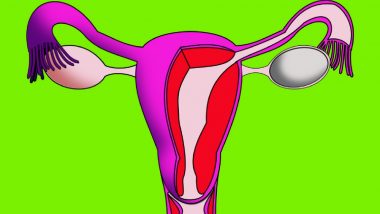Until a decade ago, the word endometriosis was relatively uncommon. It was vaguely understood as a painful disorder that afflicted women and caused infertility. Today, there an estimated 176 million women suffering from endometriosis world over, with 25 million in Indian alone. Awareness about the painful condition has significantly improved in the last couple of years, thanks to international celebrities like Padma Lakshmi, Lena Dunham and Jaime King who have opened up about their ordeal dealing with endometriosis. Read the symptoms, causes and treatment of endometriosis
Endometriosis is a condition which causes endometrial tissues to grow in places outside the uterus, causing primary or secondary infertility. Endometriosis affects the sufferer’s quality of life, causing intense, debilitating pain during periods. The disorder also puts a strain on relationships, since women also report discomfort and pain during sex. Despite being wide-spread, much of the disease is shrouded in mystery. In case you have been diagnosed with this painful condition and want to know, here are some common FAQs about endometriosis answered.
1. Is There A Cure For Endometriosis?
Presently, there is no cure for endometriosis, but treatment can help reduce the pain and infertility associated with the disease. “Depending upon the grade of endometriosis, and its symptoms, medical or surgical line of intervention is chalked out,” says Dr. Sushma Tomar, Obstetrician and Gynaecologist, Fortis Hospital, Kalyan. Medication to stop pain such as NSAIDs (non-steroidal anti-inflammatory drugs) like Aspirin, ibuprofen and diclofenac are commonly used. To suppress the excessive oestrogen levels, doctors also prescribe hormone therapy in the form of contraceptive pills, progestins and androgenic substances to patients. In some cases, surgery is performed to remove endometrial implants. Hysterectomy, which involves the removal of the uterus alone or the uterus and ovaries, is also recommended to some women.
2. Can Diet Modifications Help Reduce Endometriosis?
A well-balanced diet, replete with fresh fruit, vegetables and whole grains can improve overall health. But what can it cure or prevent endometriosis? “There is no well-established data to support that dietary modification can either prevent or reduce the symptoms of endometriosis,” says Dr. Tomar. “But there was one study that showed that a higher consumption of fruits and green vegetables was associated with lowered risk of developing endometriosis.” Among the many negatives of red meat consumption is its association with endometriosis. Dr. Tomar says that eating red meat is associated with a high risk of endometriosis. “But no association was seen with alcohol, milk or coffee. But further studies are needed to corroborate this aspect,” she says.
3. Can Weight Control Help In Treating Endometriosis?
Although it’s not a classic symptom of endometriosis, weight gain in women suffering from the condition is not unheard of. Many women struggle with their weight issues while suffering from the disorder. Bloating, which mimics weight gain, is also a common feature of endometriosis. Since endo is an oestrogen-dependent disease and the hormone is stored mainly in fat cells, reducing weight may help in improving the symptoms. “It’s difficult to lose weight if you are suffering from endometriosis because it is an oestrogen-dependent disease. Patients experience excessive fat gain in the hip and stomach areas. Patients also struggle with gas, bloating and water retention. Hence, weight control is essential in endometriosis,” says Dr. Tomar.
4. Does Stress Worsen Endometriosis?
Part and parcel of modern life, stress can worsen most health conditions. The unfortunate part of endometriosis is that women suffering from the disease tend to be more sensitive to stress than the others. “Women with endometriosis report feeling more stress and experience higher negative impact on daily activity. It could be because of fluctuating hormones,” adds Dr. Tomar. Indulging in healthy stress-busting techniques like rhythmic breathing, yoga, meditation and prayer will go a long way in managing the disorder.
5. Will Pregnancy Cure Endometriosis?
Among the many ill-gotten pieces of advice about endometriosis is that pregnancy “cures” the diseases. Many women may have been advised to plan a pregnancy as a way to mitigate endometriosis. The cruel irony is that getting pregnant on endometriosis is a feat in itself since infertility is one of the effects of the condition. However, Dr. Tomar says pregnancy may help in reducing the impact of endometriosis but in a different way. “Women don’t get their periods during the term of their pregnancy,” she says. That way, endometriosis may provide the women with a temporary respite from the pain.
6. What Are My Chances Of Having Children?
One of the telling features of endometriosis is its impact on fertility. Endo is known to cause primary and secondary infertility among women. “Low chances of childbirth are common among endometriotic women, mainly because it distorts the anatomy of the ovaries. It is an oestrogen-dependent disease, and also affects other hormones,” says Dr. Tomar. But despite the low chances, many women with endometriosis have successfully conceived and given birth.
6. Will Endometriosis Cause Cancer?
One of the common fears among women with endometriosis is whether the endometrial lesions may become cancerous after a while. But it is not endometrial cancer one should worry about but ovarian cancer. “The ratio of ovarian cancer is higher among those with endometriosis. Another type of rare cancer is adenocarcinoma (a malignant tumour), seen among slightly older patients,” Dr. Tomar points out. But that shouldn’t be a cause for alarm; although the risk is higher among women with endometriosis, the overall risk is lower than one percent.
7. Can Cosmetic Usage Worsen Endometriosis?
Holistic healing systems call for discarding cosmetics since it may contain chemicals that can disrupt the endocrine system. That’s why so many cosmetic companies have been promising paraben/phthalate-free products. It turns out that going cosmetic free may have some benefits after all. A recent study published in the Journal of Clinical Endocrinology shows that phthalates may have a role to play in the pathogenesis of endometriosis.
“Exposure to phthalates in upping the risk of gynaecological problems like breast cancer has been reported. Phthalates, a common environmental pollutant, is also found in many cosmetics and personal care products. Perineal use of talcum powder (using talc around the vulva) and its correlation to endometrial cancer is also being studied,” states Dr. Tomar. She discourages the use of toxic toiletries to curb endometriotic symptoms. “It’s not just what you put ‘in’ your body, which affects your health, but also what you put ‘on’ your body that can have an adverse effect,” she says.
8. Is Endometriosis Genetic?
The painful condition is a nightmare for women who suffer from it and it’s only made worse by the thought of possibly transmitting it to their daughters. Despite its high incidence, endometriosis is still an enigmatic illness. Not much is known about its cause whether genetic or environmental. Dr. Tomar says, “Systematic studies linking Endometriosis to genetics have not been conclusively proven, yet.”
There's still a lot to be known and understood about this enigmatic disease, especially with respect to its cause. While studies are underway, some tips such as a following a healthy diet and exercise regimen, limiting cosmetic use and adopting stress-busting habits may go a long way in mitigating some of the symptoms of endometriosis. To make any informed decision about its treatment or management, women should address all their concerns to their gynecologist.
(The above story first appeared on LatestLY on May 03, 2018 12:47 PM IST. For more news and updates on politics, world, sports, entertainment and lifestyle, log on to our website latestly.com).













 Quickly
Quickly


